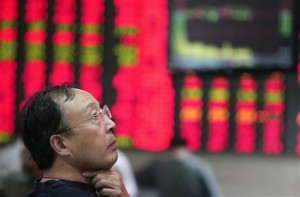China mulls cut in asset requirement for foreign investors

An investor looks at the stock price monitor at a private securities company Monday, June 18, 2012, in Shanghai, China. China is proposing to slash the asset requirements for foreign institutions wanting to invest in its stock markets as it seeks to boost foreign investment and open up its capital markets. AP PHOTO
SHANGHAI—China is proposing to slash the asset requirements for foreign institutions wanting to invest in its stock markets as it seeks to boost foreign investment and open up its capital markets.
Foreign individuals are barred from investing directly in China’s markets, but the country allows certain institutions to buy shares under the so-called Qualified Foreign Institutional Investor (QFII) scheme.
A proposal released by the securities regulator on Wednesday would see the amount of assets foreign institutions must hold to gain access to China’s markets reduced from $5 billion to $500 million.
The China Securities Regulatory Commission also plans to raise the maximum stake foreign institutions can hold in a listed Chinese company to 30 percent from 20 percent, and allow them to enter the interbank bond market.
The latest moves to relax restrictions came after Beijing in April nearly tripled the amount of money selected foreign institutions can invest in Chinese stocks, bonds and bank deposits to $80 billion.
“This move is part of the securities regulator’s long-term program of opening up China’s capital markets,” Jiang Shiqing, an analyst at Industrial Securities, told AFP, adding that lowering the qualifications would “definitely attract new overseas investors.”
Foreign investment under the QFII scheme currently accounts for only around 1.1 percent of the total market value of Chinese stock markets, compared to a regional average of around 30 percent in regional markets, the regulator said.
Investment quotas have risen steadily since the scheme was first launched in 2002 on a trial basis. The total currently stands at $27.3 billion.